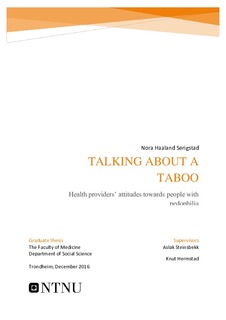| dc.description.abstract | Abstract
Background and aim Pedophilia is a taboo-laden topic, and there are many controversies and unanswered questions, such as questions concerning the prevalence, etiology and changeability of pedophilia, and the possibilities for treatment for people with pedophilia. In addition, pedophilia is often confused to be synonymous with child sexual abuse. Thus, individuals who experience sexual attraction to children find it difficult to seek help within the health care system, and it is not known how health providers relate to people with pedophilia. This study aimed to explore health providers’ experience with and attitudes towards people with pedophilia.
Method
A qualitative study using individual semi-structured interviews with nine health providers with treatment responsibility in Central Norway was conducted in the fall of 2016. The informants were asked about their experience with people with pedophilia and their emotions, thoughts and actions towards people with pedophilia. The data was analyzed according to the method of systematic text condensation.
Results
Most of the informants had limited experience with people with pedophilia, and there were expressed a lack of knowledge on the subject. There were expressed surprise over the estimated prevalence of persons with sexual attraction towards children, which was higher than expected. Some saw dealing with patients with pedophilia as unproblematic, while others found even talking about it provoking with a lot of negative feelings. It was said that many aspects of dealing with people with pedophilia was problematic, such as communication, the patient-health provider relationship and the responsibility of assessing dangerousness. Most were unsure about the etiology of pedophilia and hence had different thoughts on what can be offered to people with pedophilia in the health care system.
Conclusion
The finding in this study indicate that health care professionals need more knowledge regarding communication and the patient-health provider relationship when dealing with people with pedophilia. The lacking consensus both among experts and regular mental health providers on the etiology and definition of pedophilia indicates that a continued questioning of the appropriateness of this diagnosis should be encouraged. The health providers showed a willingness to accept people with pedophilia for treatment, but the lack of consensus on what can be achieved through therapy makes it necessary with further research on this area. | nb_NO |
